Mental Health Services: Consumer Voice and Participation Analysis
VerifiedAdded on 2021/04/16
|6
|1763
|80
Essay
AI Summary
This essay explores the critical role of consumer voice and active participation in mental health services. It emphasizes the importance of involving individuals with mental health conditions in their treatment and care, highlighting the benefits of peer support programs, advocacy efforts, and recovery-oriented approaches. The essay examines research findings on the positive impacts of online peer support, mental health advocacy, and recovery-oriented care in various settings. It also addresses the impact of stigma, discrimination, and the need for person-centered care that respects patient consent and communication. The conclusion underscores the importance of empowering individuals, promoting equal rights, and understanding societal factors affecting mental health to facilitate successful recovery and improve overall well-being.
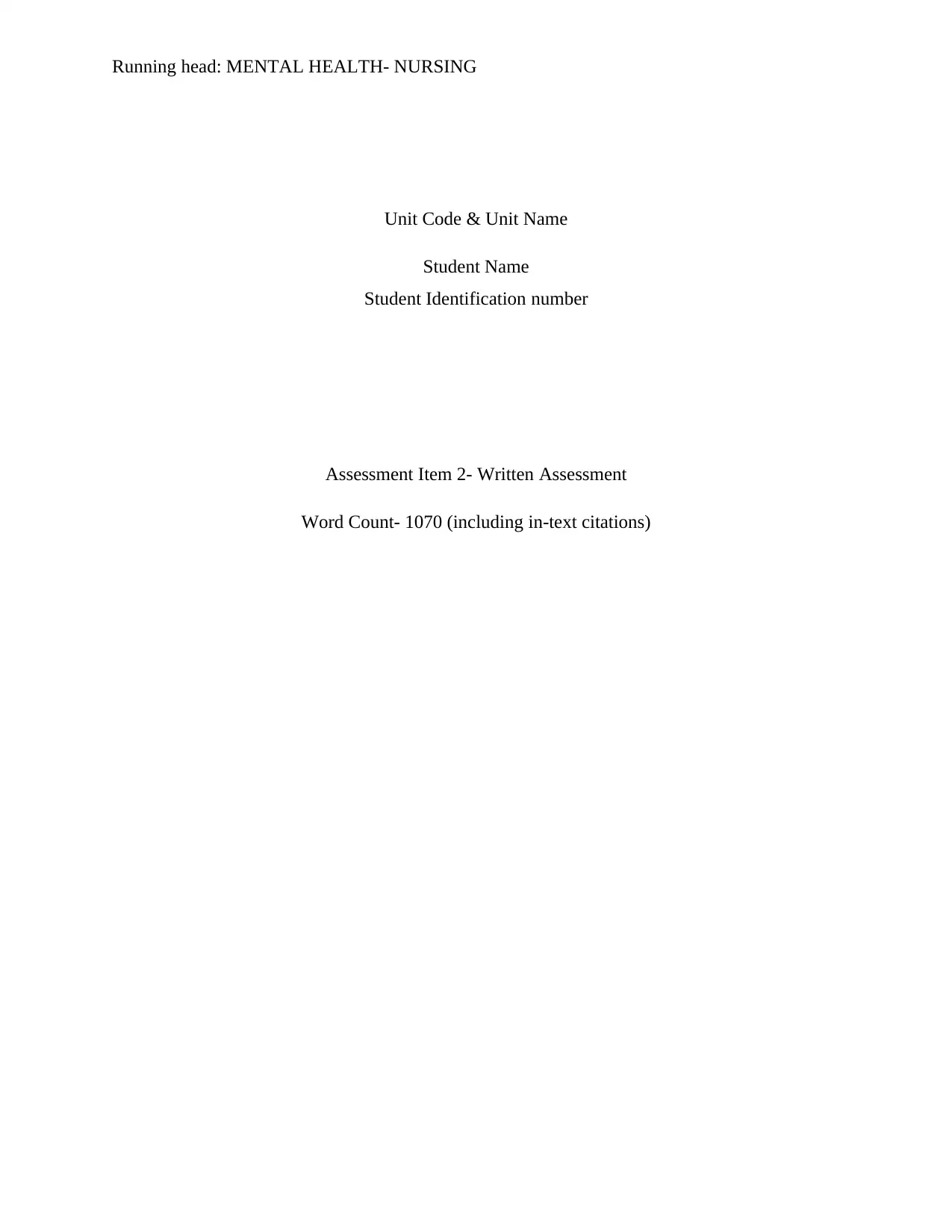
Running head: MENTAL HEALTH- NURSING
Unit Code & Unit Name
Student Name
Student Identification number
Assessment Item 2- Written Assessment
Word Count- 1070 (including in-text citations)
Unit Code & Unit Name
Student Name
Student Identification number
Assessment Item 2- Written Assessment
Word Count- 1070 (including in-text citations)
Paraphrase This Document
Need a fresh take? Get an instant paraphrase of this document with our AI Paraphraser
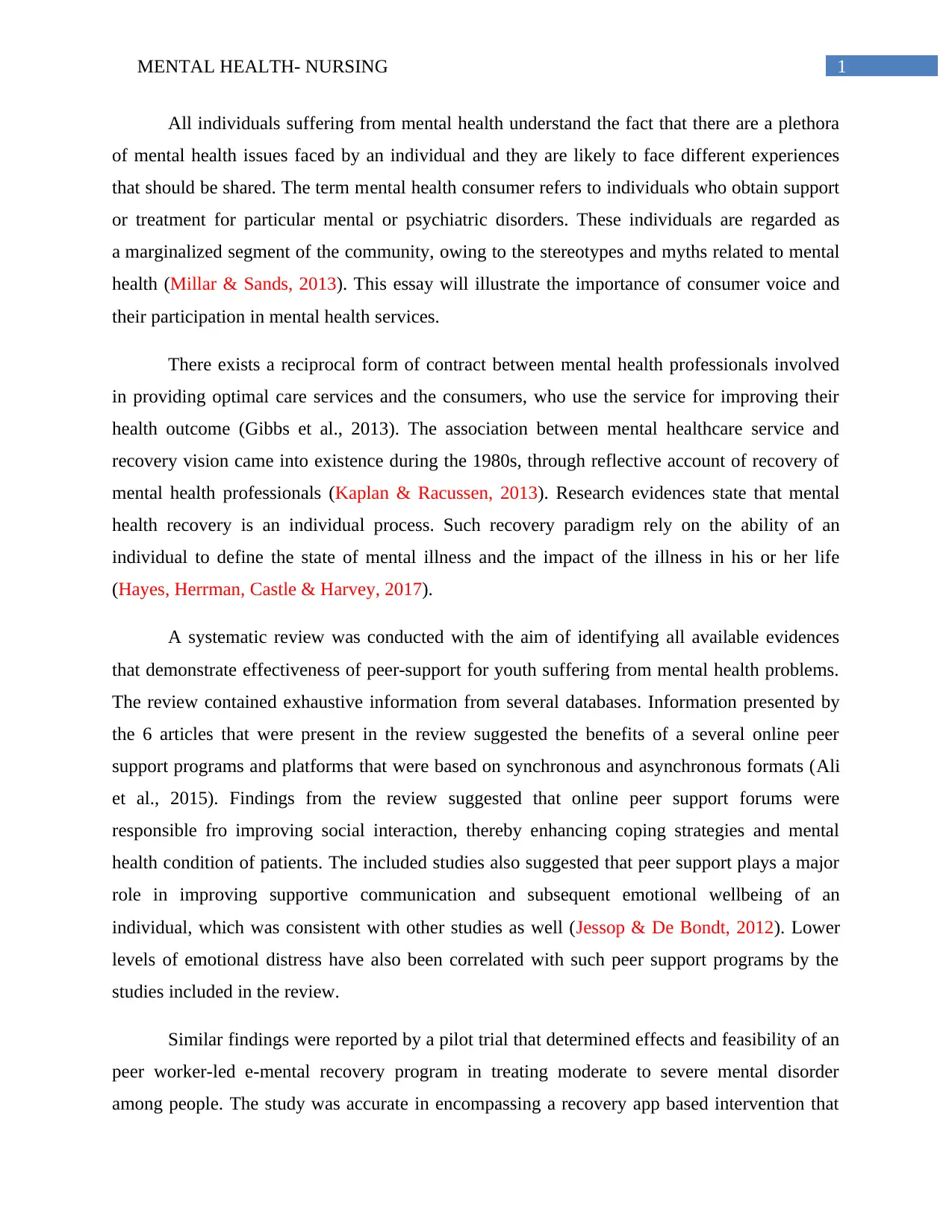
1MENTAL HEALTH- NURSING
All individuals suffering from mental health understand the fact that there are a plethora
of mental health issues faced by an individual and they are likely to face different experiences
that should be shared. The term mental health consumer refers to individuals who obtain support
or treatment for particular mental or psychiatric disorders. These individuals are regarded as
a marginalized segment of the community, owing to the stereotypes and myths related to mental
health (Millar & Sands, 2013). This essay will illustrate the importance of consumer voice and
their participation in mental health services.
There exists a reciprocal form of contract between mental health professionals involved
in providing optimal care services and the consumers, who use the service for improving their
health outcome (Gibbs et al., 2013). The association between mental healthcare service and
recovery vision came into existence during the 1980s, through reflective account of recovery of
mental health professionals (Kaplan & Racussen, 2013). Research evidences state that mental
health recovery is an individual process. Such recovery paradigm rely on the ability of an
individual to define the state of mental illness and the impact of the illness in his or her life
(Hayes, Herrman, Castle & Harvey, 2017).
A systematic review was conducted with the aim of identifying all available evidences
that demonstrate effectiveness of peer-support for youth suffering from mental health problems.
The review contained exhaustive information from several databases. Information presented by
the 6 articles that were present in the review suggested the benefits of a several online peer
support programs and platforms that were based on synchronous and asynchronous formats (Ali
et al., 2015). Findings from the review suggested that online peer support forums were
responsible fro improving social interaction, thereby enhancing coping strategies and mental
health condition of patients. The included studies also suggested that peer support plays a major
role in improving supportive communication and subsequent emotional wellbeing of an
individual, which was consistent with other studies as well (Jessop & De Bondt, 2012). Lower
levels of emotional distress have also been correlated with such peer support programs by the
studies included in the review.
Similar findings were reported by a pilot trial that determined effects and feasibility of an
peer worker-led e-mental recovery program in treating moderate to severe mental disorder
among people. The study was accurate in encompassing a recovery app based intervention that
All individuals suffering from mental health understand the fact that there are a plethora
of mental health issues faced by an individual and they are likely to face different experiences
that should be shared. The term mental health consumer refers to individuals who obtain support
or treatment for particular mental or psychiatric disorders. These individuals are regarded as
a marginalized segment of the community, owing to the stereotypes and myths related to mental
health (Millar & Sands, 2013). This essay will illustrate the importance of consumer voice and
their participation in mental health services.
There exists a reciprocal form of contract between mental health professionals involved
in providing optimal care services and the consumers, who use the service for improving their
health outcome (Gibbs et al., 2013). The association between mental healthcare service and
recovery vision came into existence during the 1980s, through reflective account of recovery of
mental health professionals (Kaplan & Racussen, 2013). Research evidences state that mental
health recovery is an individual process. Such recovery paradigm rely on the ability of an
individual to define the state of mental illness and the impact of the illness in his or her life
(Hayes, Herrman, Castle & Harvey, 2017).
A systematic review was conducted with the aim of identifying all available evidences
that demonstrate effectiveness of peer-support for youth suffering from mental health problems.
The review contained exhaustive information from several databases. Information presented by
the 6 articles that were present in the review suggested the benefits of a several online peer
support programs and platforms that were based on synchronous and asynchronous formats (Ali
et al., 2015). Findings from the review suggested that online peer support forums were
responsible fro improving social interaction, thereby enhancing coping strategies and mental
health condition of patients. The included studies also suggested that peer support plays a major
role in improving supportive communication and subsequent emotional wellbeing of an
individual, which was consistent with other studies as well (Jessop & De Bondt, 2012). Lower
levels of emotional distress have also been correlated with such peer support programs by the
studies included in the review.
Similar findings were reported by a pilot trial that determined effects and feasibility of an
peer worker-led e-mental recovery program in treating moderate to severe mental disorder
among people. The study was accurate in encompassing a recovery app based intervention that
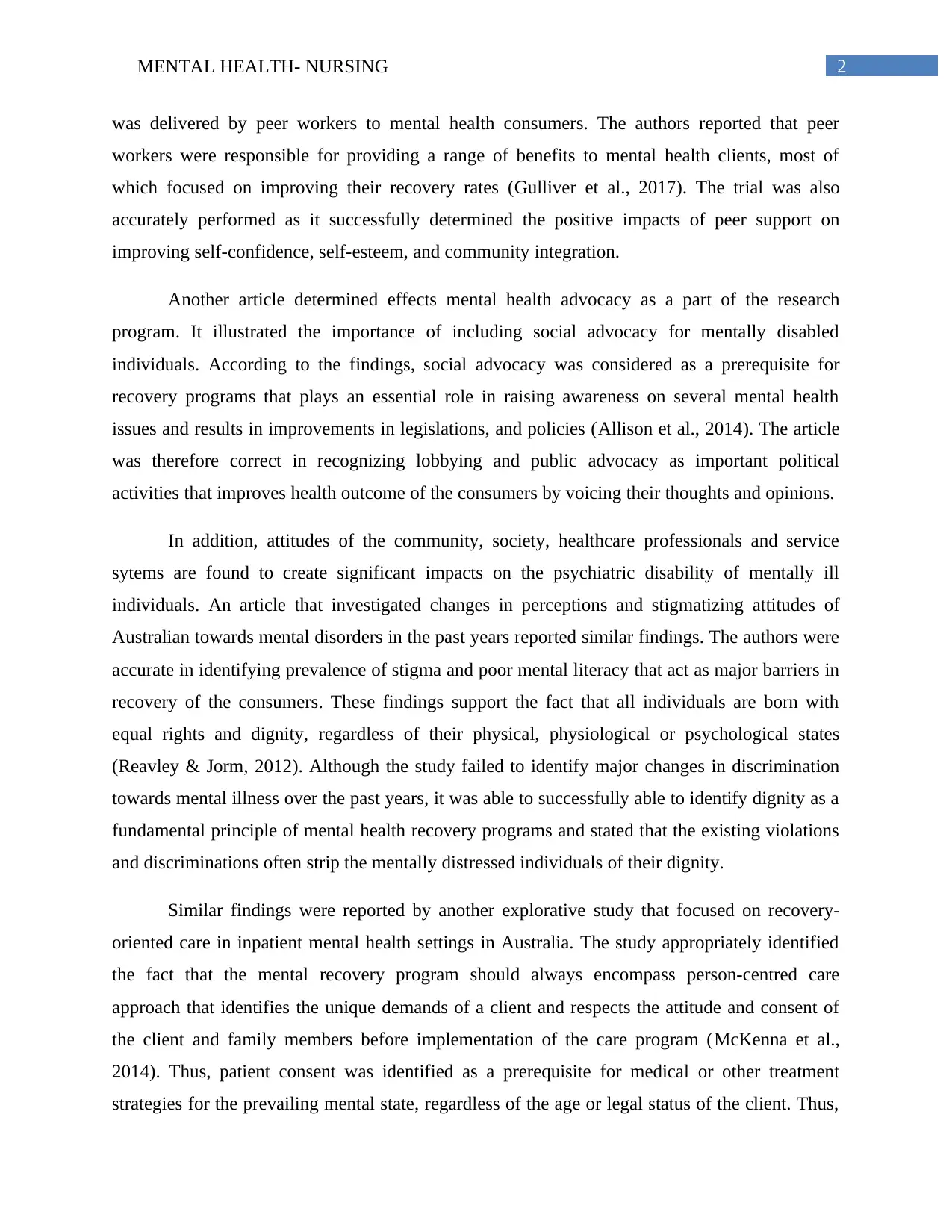
2MENTAL HEALTH- NURSING
was delivered by peer workers to mental health consumers. The authors reported that peer
workers were responsible for providing a range of benefits to mental health clients, most of
which focused on improving their recovery rates (Gulliver et al., 2017). The trial was also
accurately performed as it successfully determined the positive impacts of peer support on
improving self-confidence, self-esteem, and community integration.
Another article determined effects mental health advocacy as a part of the research
program. It illustrated the importance of including social advocacy for mentally disabled
individuals. According to the findings, social advocacy was considered as a prerequisite for
recovery programs that plays an essential role in raising awareness on several mental health
issues and results in improvements in legislations, and policies (Allison et al., 2014). The article
was therefore correct in recognizing lobbying and public advocacy as important political
activities that improves health outcome of the consumers by voicing their thoughts and opinions.
In addition, attitudes of the community, society, healthcare professionals and service
sytems are found to create significant impacts on the psychiatric disability of mentally ill
individuals. An article that investigated changes in perceptions and stigmatizing attitudes of
Australian towards mental disorders in the past years reported similar findings. The authors were
accurate in identifying prevalence of stigma and poor mental literacy that act as major barriers in
recovery of the consumers. These findings support the fact that all individuals are born with
equal rights and dignity, regardless of their physical, physiological or psychological states
(Reavley & Jorm, 2012). Although the study failed to identify major changes in discrimination
towards mental illness over the past years, it was able to successfully able to identify dignity as a
fundamental principle of mental health recovery programs and stated that the existing violations
and discriminations often strip the mentally distressed individuals of their dignity.
Similar findings were reported by another explorative study that focused on recovery-
oriented care in inpatient mental health settings in Australia. The study appropriately identified
the fact that the mental recovery program should always encompass person-centred care
approach that identifies the unique demands of a client and respects the attitude and consent of
the client and family members before implementation of the care program (McKenna et al.,
2014). Thus, patient consent was identified as a prerequisite for medical or other treatment
strategies for the prevailing mental state, regardless of the age or legal status of the client. Thus,
was delivered by peer workers to mental health consumers. The authors reported that peer
workers were responsible for providing a range of benefits to mental health clients, most of
which focused on improving their recovery rates (Gulliver et al., 2017). The trial was also
accurately performed as it successfully determined the positive impacts of peer support on
improving self-confidence, self-esteem, and community integration.
Another article determined effects mental health advocacy as a part of the research
program. It illustrated the importance of including social advocacy for mentally disabled
individuals. According to the findings, social advocacy was considered as a prerequisite for
recovery programs that plays an essential role in raising awareness on several mental health
issues and results in improvements in legislations, and policies (Allison et al., 2014). The article
was therefore correct in recognizing lobbying and public advocacy as important political
activities that improves health outcome of the consumers by voicing their thoughts and opinions.
In addition, attitudes of the community, society, healthcare professionals and service
sytems are found to create significant impacts on the psychiatric disability of mentally ill
individuals. An article that investigated changes in perceptions and stigmatizing attitudes of
Australian towards mental disorders in the past years reported similar findings. The authors were
accurate in identifying prevalence of stigma and poor mental literacy that act as major barriers in
recovery of the consumers. These findings support the fact that all individuals are born with
equal rights and dignity, regardless of their physical, physiological or psychological states
(Reavley & Jorm, 2012). Although the study failed to identify major changes in discrimination
towards mental illness over the past years, it was able to successfully able to identify dignity as a
fundamental principle of mental health recovery programs and stated that the existing violations
and discriminations often strip the mentally distressed individuals of their dignity.
Similar findings were reported by another explorative study that focused on recovery-
oriented care in inpatient mental health settings in Australia. The study appropriately identified
the fact that the mental recovery program should always encompass person-centred care
approach that identifies the unique demands of a client and respects the attitude and consent of
the client and family members before implementation of the care program (McKenna et al.,
2014). Thus, patient consent was identified as a prerequisite for medical or other treatment
strategies for the prevailing mental state, regardless of the age or legal status of the client. Thus,
⊘ This is a preview!⊘
Do you want full access?
Subscribe today to unlock all pages.

Trusted by 1+ million students worldwide
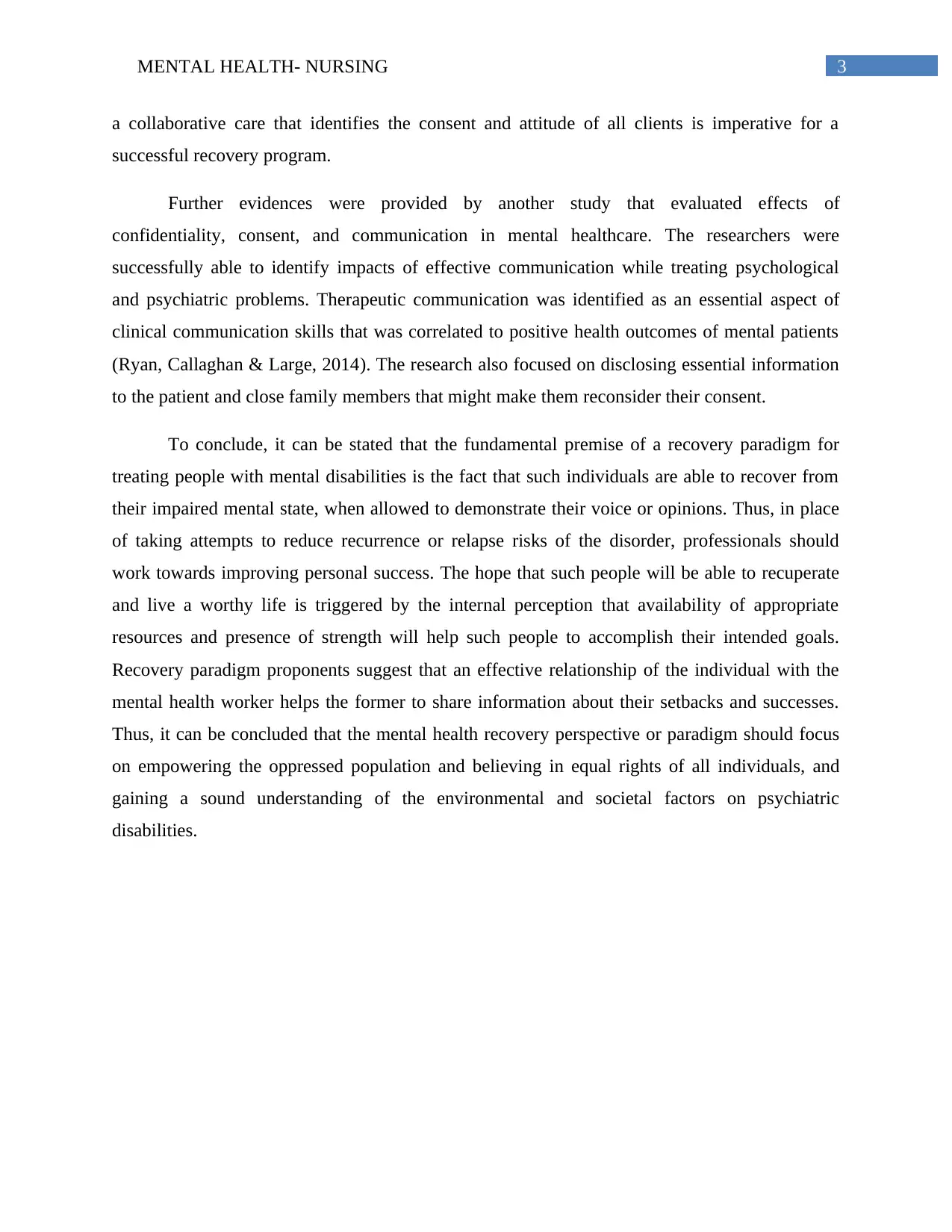
3MENTAL HEALTH- NURSING
a collaborative care that identifies the consent and attitude of all clients is imperative for a
successful recovery program.
Further evidences were provided by another study that evaluated effects of
confidentiality, consent, and communication in mental healthcare. The researchers were
successfully able to identify impacts of effective communication while treating psychological
and psychiatric problems. Therapeutic communication was identified as an essential aspect of
clinical communication skills that was correlated to positive health outcomes of mental patients
(Ryan, Callaghan & Large, 2014). The research also focused on disclosing essential information
to the patient and close family members that might make them reconsider their consent.
To conclude, it can be stated that the fundamental premise of a recovery paradigm for
treating people with mental disabilities is the fact that such individuals are able to recover from
their impaired mental state, when allowed to demonstrate their voice or opinions. Thus, in place
of taking attempts to reduce recurrence or relapse risks of the disorder, professionals should
work towards improving personal success. The hope that such people will be able to recuperate
and live a worthy life is triggered by the internal perception that availability of appropriate
resources and presence of strength will help such people to accomplish their intended goals.
Recovery paradigm proponents suggest that an effective relationship of the individual with the
mental health worker helps the former to share information about their setbacks and successes.
Thus, it can be concluded that the mental health recovery perspective or paradigm should focus
on empowering the oppressed population and believing in equal rights of all individuals, and
gaining a sound understanding of the environmental and societal factors on psychiatric
disabilities.
a collaborative care that identifies the consent and attitude of all clients is imperative for a
successful recovery program.
Further evidences were provided by another study that evaluated effects of
confidentiality, consent, and communication in mental healthcare. The researchers were
successfully able to identify impacts of effective communication while treating psychological
and psychiatric problems. Therapeutic communication was identified as an essential aspect of
clinical communication skills that was correlated to positive health outcomes of mental patients
(Ryan, Callaghan & Large, 2014). The research also focused on disclosing essential information
to the patient and close family members that might make them reconsider their consent.
To conclude, it can be stated that the fundamental premise of a recovery paradigm for
treating people with mental disabilities is the fact that such individuals are able to recover from
their impaired mental state, when allowed to demonstrate their voice or opinions. Thus, in place
of taking attempts to reduce recurrence or relapse risks of the disorder, professionals should
work towards improving personal success. The hope that such people will be able to recuperate
and live a worthy life is triggered by the internal perception that availability of appropriate
resources and presence of strength will help such people to accomplish their intended goals.
Recovery paradigm proponents suggest that an effective relationship of the individual with the
mental health worker helps the former to share information about their setbacks and successes.
Thus, it can be concluded that the mental health recovery perspective or paradigm should focus
on empowering the oppressed population and believing in equal rights of all individuals, and
gaining a sound understanding of the environmental and societal factors on psychiatric
disabilities.
Paraphrase This Document
Need a fresh take? Get an instant paraphrase of this document with our AI Paraphraser
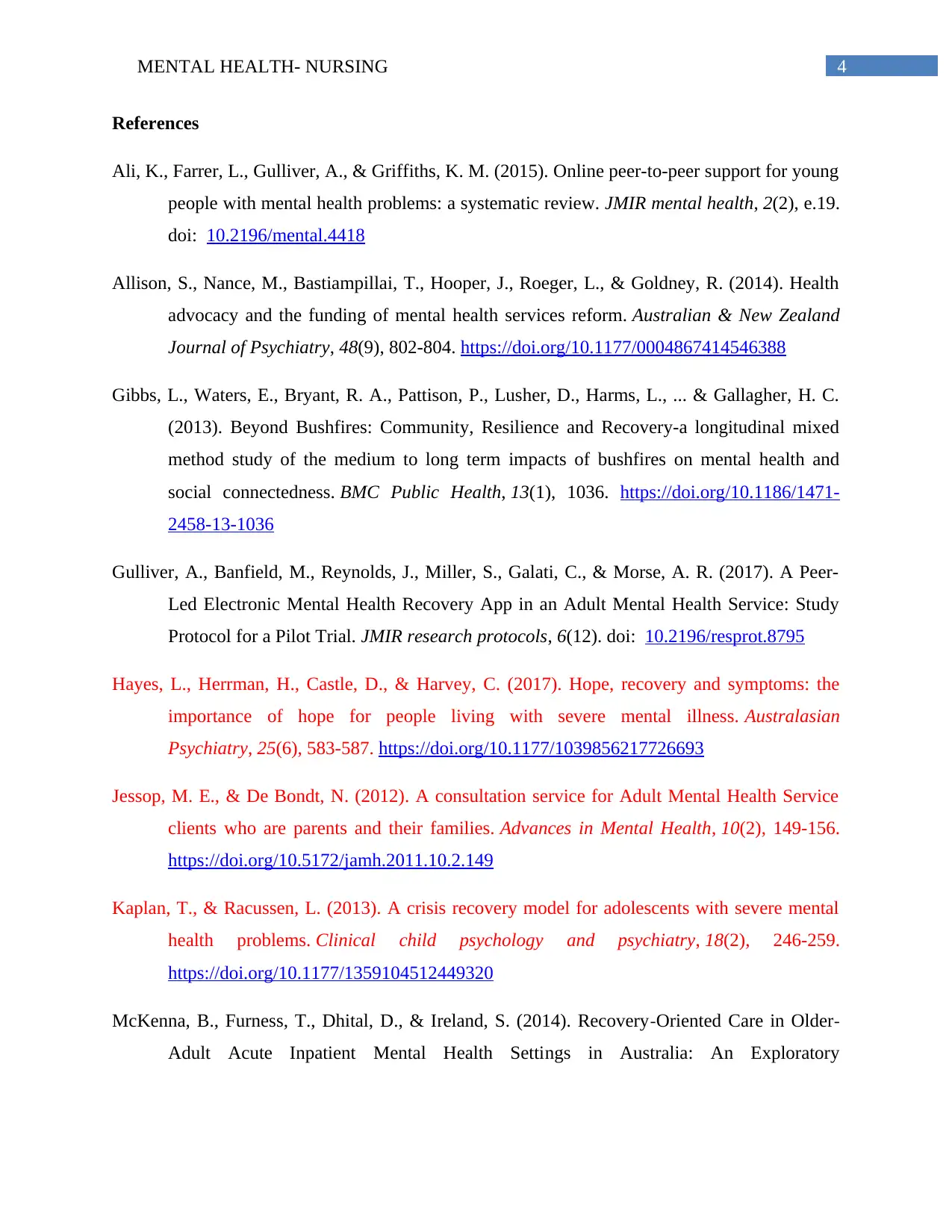
4MENTAL HEALTH- NURSING
References
Ali, K., Farrer, L., Gulliver, A., & Griffiths, K. M. (2015). Online peer-to-peer support for young
people with mental health problems: a systematic review. JMIR mental health, 2(2), e.19.
doi: 10.2196/mental.4418
Allison, S., Nance, M., Bastiampillai, T., Hooper, J., Roeger, L., & Goldney, R. (2014). Health
advocacy and the funding of mental health services reform. Australian & New Zealand
Journal of Psychiatry, 48(9), 802-804. https://doi.org/10.1177/0004867414546388
Gibbs, L., Waters, E., Bryant, R. A., Pattison, P., Lusher, D., Harms, L., ... & Gallagher, H. C.
(2013). Beyond Bushfires: Community, Resilience and Recovery-a longitudinal mixed
method study of the medium to long term impacts of bushfires on mental health and
social connectedness. BMC Public Health, 13(1), 1036. https://doi.org/10.1186/1471-
2458-13-1036
Gulliver, A., Banfield, M., Reynolds, J., Miller, S., Galati, C., & Morse, A. R. (2017). A Peer-
Led Electronic Mental Health Recovery App in an Adult Mental Health Service: Study
Protocol for a Pilot Trial. JMIR research protocols, 6(12). doi: 10.2196/resprot.8795
Hayes, L., Herrman, H., Castle, D., & Harvey, C. (2017). Hope, recovery and symptoms: the
importance of hope for people living with severe mental illness. Australasian
Psychiatry, 25(6), 583-587. https://doi.org/10.1177/1039856217726693
Jessop, M. E., & De Bondt, N. (2012). A consultation service for Adult Mental Health Service
clients who are parents and their families. Advances in Mental Health, 10(2), 149-156.
https://doi.org/10.5172/jamh.2011.10.2.149
Kaplan, T., & Racussen, L. (2013). A crisis recovery model for adolescents with severe mental
health problems. Clinical child psychology and psychiatry, 18(2), 246-259.
https://doi.org/10.1177/1359104512449320
McKenna, B., Furness, T., Dhital, D., & Ireland, S. (2014). Recovery‐Oriented Care in Older‐
Adult Acute Inpatient Mental Health Settings in Australia: An Exploratory
References
Ali, K., Farrer, L., Gulliver, A., & Griffiths, K. M. (2015). Online peer-to-peer support for young
people with mental health problems: a systematic review. JMIR mental health, 2(2), e.19.
doi: 10.2196/mental.4418
Allison, S., Nance, M., Bastiampillai, T., Hooper, J., Roeger, L., & Goldney, R. (2014). Health
advocacy and the funding of mental health services reform. Australian & New Zealand
Journal of Psychiatry, 48(9), 802-804. https://doi.org/10.1177/0004867414546388
Gibbs, L., Waters, E., Bryant, R. A., Pattison, P., Lusher, D., Harms, L., ... & Gallagher, H. C.
(2013). Beyond Bushfires: Community, Resilience and Recovery-a longitudinal mixed
method study of the medium to long term impacts of bushfires on mental health and
social connectedness. BMC Public Health, 13(1), 1036. https://doi.org/10.1186/1471-
2458-13-1036
Gulliver, A., Banfield, M., Reynolds, J., Miller, S., Galati, C., & Morse, A. R. (2017). A Peer-
Led Electronic Mental Health Recovery App in an Adult Mental Health Service: Study
Protocol for a Pilot Trial. JMIR research protocols, 6(12). doi: 10.2196/resprot.8795
Hayes, L., Herrman, H., Castle, D., & Harvey, C. (2017). Hope, recovery and symptoms: the
importance of hope for people living with severe mental illness. Australasian
Psychiatry, 25(6), 583-587. https://doi.org/10.1177/1039856217726693
Jessop, M. E., & De Bondt, N. (2012). A consultation service for Adult Mental Health Service
clients who are parents and their families. Advances in Mental Health, 10(2), 149-156.
https://doi.org/10.5172/jamh.2011.10.2.149
Kaplan, T., & Racussen, L. (2013). A crisis recovery model for adolescents with severe mental
health problems. Clinical child psychology and psychiatry, 18(2), 246-259.
https://doi.org/10.1177/1359104512449320
McKenna, B., Furness, T., Dhital, D., & Ireland, S. (2014). Recovery‐Oriented Care in Older‐
Adult Acute Inpatient Mental Health Settings in Australia: An Exploratory
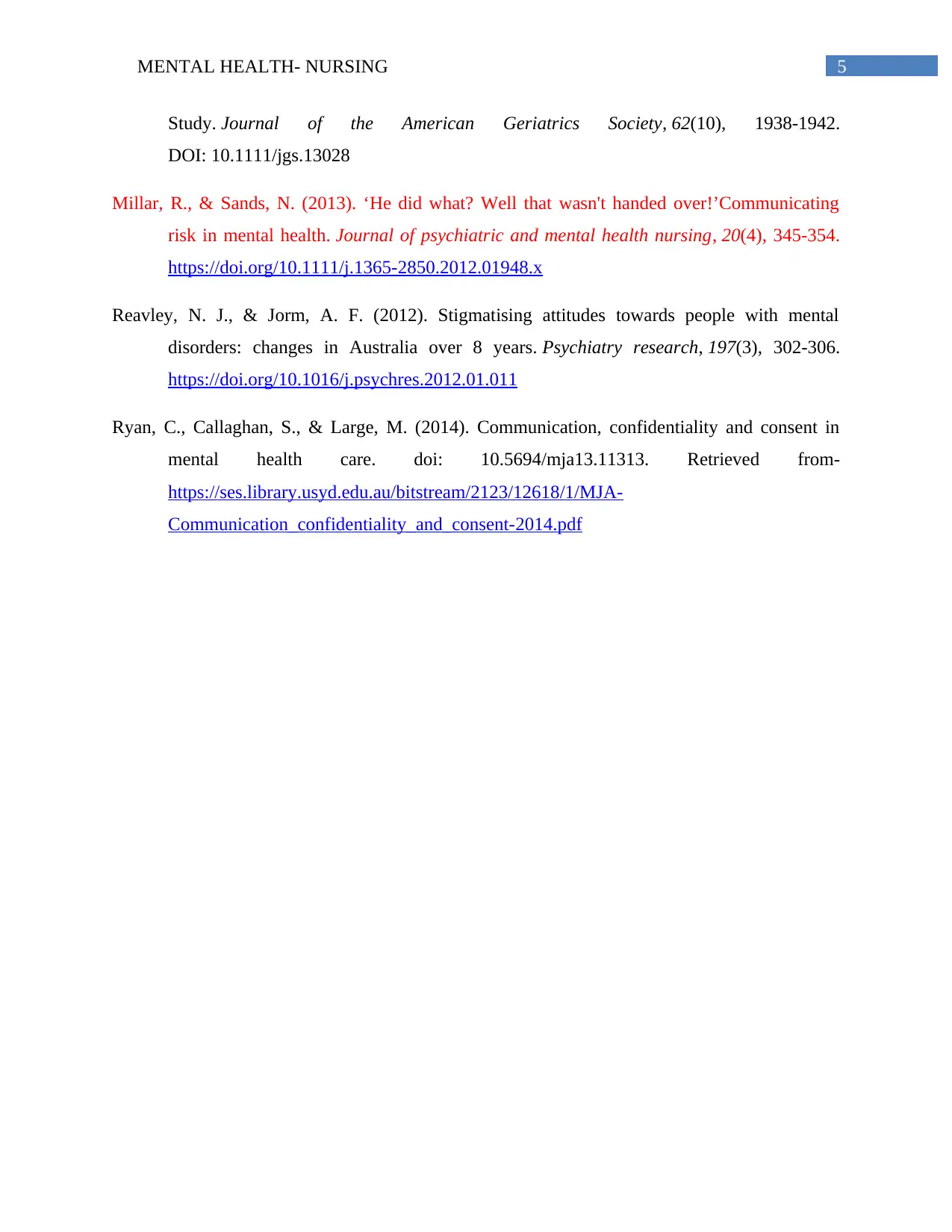
5MENTAL HEALTH- NURSING
Study. Journal of the American Geriatrics Society, 62(10), 1938-1942.
DOI: 10.1111/jgs.13028
Millar, R., & Sands, N. (2013). ‘He did what? Well that wasn't handed over!’Communicating
risk in mental health. Journal of psychiatric and mental health nursing, 20(4), 345-354.
https://doi.org/10.1111/j.1365-2850.2012.01948.x
Reavley, N. J., & Jorm, A. F. (2012). Stigmatising attitudes towards people with mental
disorders: changes in Australia over 8 years. Psychiatry research, 197(3), 302-306.
https://doi.org/10.1016/j.psychres.2012.01.011
Ryan, C., Callaghan, S., & Large, M. (2014). Communication, confidentiality and consent in
mental health care. doi: 10.5694/mja13.11313. Retrieved from-
https://ses.library.usyd.edu.au/bitstream/2123/12618/1/MJA-
Communication_confidentiality_and_consent-2014.pdf
Study. Journal of the American Geriatrics Society, 62(10), 1938-1942.
DOI: 10.1111/jgs.13028
Millar, R., & Sands, N. (2013). ‘He did what? Well that wasn't handed over!’Communicating
risk in mental health. Journal of psychiatric and mental health nursing, 20(4), 345-354.
https://doi.org/10.1111/j.1365-2850.2012.01948.x
Reavley, N. J., & Jorm, A. F. (2012). Stigmatising attitudes towards people with mental
disorders: changes in Australia over 8 years. Psychiatry research, 197(3), 302-306.
https://doi.org/10.1016/j.psychres.2012.01.011
Ryan, C., Callaghan, S., & Large, M. (2014). Communication, confidentiality and consent in
mental health care. doi: 10.5694/mja13.11313. Retrieved from-
https://ses.library.usyd.edu.au/bitstream/2123/12618/1/MJA-
Communication_confidentiality_and_consent-2014.pdf
⊘ This is a preview!⊘
Do you want full access?
Subscribe today to unlock all pages.

Trusted by 1+ million students worldwide
1 out of 6
Related Documents
Your All-in-One AI-Powered Toolkit for Academic Success.
+13062052269
info@desklib.com
Available 24*7 on WhatsApp / Email
![[object Object]](/_next/static/media/star-bottom.7253800d.svg)
Unlock your academic potential
Copyright © 2020–2025 A2Z Services. All Rights Reserved. Developed and managed by ZUCOL.





